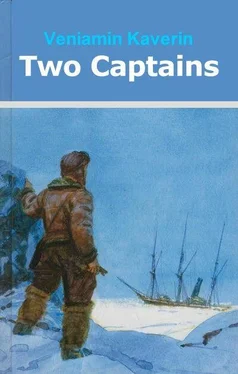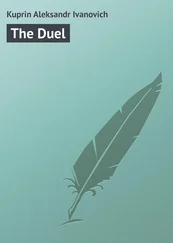Stroke, stroke, fat one, thin one, crooked one, five, twenty, a hundred…
"The saddest thing of all was that my father, on coming out of prison, took to drink, and when a man indulges in liquor his house goes to wrack and ruin. Then death struck him down, most sudden and untimely, being the result of his skinning the carcass of a horse."
I know exactly what happened afterwards to my teacher's father. He became bloated and "the coffin they'd started to make had to be altered in a hurry, because the figure of the dead man was three times its living size". I once dreamt of this horrid death.
Stroke, stroke, stroke… The pen squeaks, stroke, blot…
"And so our family hearth became desolated. But I did not lose heart and did not become a burden to my mother at the age of eleven."
My teacher looks at me. Though I'm only ten, I begin to fidget uneasily on my stool.
"I entered the employ of a restaurant, and became a servant and errand-boy, but was no longer an extra mouth living on my mother's earnings."
My mother is sitting at the same table, listening to him spellbound. She is mending shirts-Father's shirts-and I know who she is mending them for. It is with presentiment of ill that I look up at my mother's pale face, at her black hair parted in the middle, at her slim hands-and turn back to my strokes. I feel like drawing one long line through the strokes, they would make a lovely fence-but I mustn't. The strokes must be "popindicular".
"Meanwhile," Scaramouch goes on, "my mother became noticeably addicted to acts of charity. What do I do? Seeing that this tendency was adversely affecting my development I turned to my uncle Nikita Zuyev of never-to-be-forgotten memory, and asked him to influence my mother."
This was the hundredth time I was hearing about that uncle of never-to-be-forgotten memory, and I pictured a fat old man with the same pimply face arriving in the village in a wide country sledge, taking off his yellow sheepskin coat as he comes in, and crossing himself in front of the icon. He beats the mother, while little Scaramouch stands by and calmly watches his mother being beaten.
Strokes, strokes… But the fence is there already-done long ago, and though I know very well what I am in for, I quickly draw the sun, some birds and clouds above the fence. Scaramouch glances at me as he talks, and I hastily cover up the sun and the birds with my sleeve. Too late! He picks up my exercise book. His eyebrows go up. I stand up.
"Now just have a look, Aksinya Fyodorovna, what your dear little son has been doing!"
And my mother, who had never beaten us children while Father was alive, seizes my ear and bangs my head on the table.
My lessons came to an end the day that Scaramouch moved into our house. The day before that there had been the wedding, which Aunt Dasha, pleading illness, did not attend. I remember how smart Mother looked at the wedding. She wore a jacket of white velvet, a gift from the bridegroom, and had her hair done like a girl's, with braids wound crosswise round her head. She talked and drank and smiled, but every now and then she passed her hand across her face with a strange expression. Scaramouch made a speech in which he drew attention to the service he was rendering the poor family, which was "definitely heading for ruin inasmuch as its erstwhile breadwinner had left behind him a scene of devastation", and mentioned, among other things, that he had opened to me the door of "general education", by which he evidently meant those "popindicular" strokes of his.
I don't think Mother heard the speech at all. She sat with lowered head at her bridegroom's side, and then, with a sudden frown, stared in front of her with a look of perplexity.
Skovorodnikov, who had been drinking heavily, went up to her and slapped her on the shoulder.
"Ah, Aksinya, you've given a lark to catch a…"
She smiled weakly, hastily.
For about two months after the wedding my stepfather worked in the wharf office, and though it was very painful to see him come in and sprawl in the place where my father used to sit, and eat with his spoon from his plate, life was bearable so long as I kept to myself, ran away and did not return home until he was asleep. But shortly he was kicked out of the office for some shady business, and then life became unbearable. The unhappy idea of taking in hand our upbringing, my and my sister's, entered that muddled head of his, and from then on I did not have a moment to myself.
Looking back, I realise that he had been employed in his youth as a servant. Obviously, he must have seen somewhere all those absurd and queer things he was making me and my sister perform.
First of all, he demanded that we come and greet him in the morning, though we slept on the floor within two paces of his bed. And we did so. But no power on earth could force me to say: "Good morning. Daddy!" It wasn't a good morning, and he wasn't Daddy. We dare not sit down at the table before him, and we had to ask permission to get up. We had to thank him, though Mother still did the washing at the hospital, and my sister cooked the dinner, which was bought with Mother's money and mine. I remember the despair that seized me when poor Sanya rose from the table and with the clumsy curtsy he had taught her, said for the first time: "Thank you, Daddy." I felt like throwing my plate with the unfinished porridge into that fat face! But I did not do it, and regret it to this day.
Chapter Ten
AUNT DASHA
I would not, perhaps, be recalling this period of my life were it not for the dear figure that rises before me-that of Aunt Dasha, whom, for the first time, I then came consciously to appreciate and love.
I used to go to her and just sit there, saying nothing-she knew everything as it was. To comfort me she used to tell me the story of her life. At twenty-five she was already a widow. Her husband had been killed at the very beginning of the Russo-Japanese War. I learnt with surprise that she was not yet forty. I had thought her an old woman, especially when she put on her spectacles of an evening and read to us those letters which the flood-water had brought to our yard (she was still reading them). She read one letter every evening. It had become for her a sort of ritual. The ritual began with her trying to guess the contents of a letter from its envelope and from the address, which in most cases had been entirely washed away.
And then would come the reading, performed unhurriedly, with long sighs and grumblings when any words were illegible. Aunt Dasha rejoiced with the strangers in their joys and shared with them their sorrows; some she scolded, others she praised. In short, these letters might have been addressed to her personally, the way she took them. She read books in just the same way. She dealt with the family and love affairs of dukes and counts, heroes of the supplements to the Homeland magazine, as though all those dukes and counts lived in the yard next door.
"That Baron L., now," she would say animatedly, "I knew he would jilt Madame de Sans-le-Sou. My love, my love-and then this! A fine fellow, I must say!"
When, escaping from the presence of Scaramouch I spent the evenings with her, she was already finishing her mail, with only some fifteen letters left to read. Among them was one which I must quote here. Aunt Dasha could not understand it, but it seemed to me, already at that time, that it had some bearing on the letter of the navigating officer.
Here it is (the opening lines Aunt Dasha was unable to decipher):
"One thing I beg of you: do not trust that man! It can positively be said that we owe all our misfortunes to him alone. Suffice it to say that most of the sixty dogs he sold to us at Archangel had had to be shot while we were still at Novaya Zemlya. That's the price we had to pay for that good office. Not I alone, but the whole expedition send him our curses. We were taking a chance, we knew that we were running a risk, but we did not expect such a blow. It remains for us to do all we can. There is so much I could tell you about our voyage! Stories enough to last Katya a whole winter. But what a price we are having to pay, good God! I don't want you to think that our plight is hopeless. Still, you shouldn't look forward too much-"
Читать дальше












